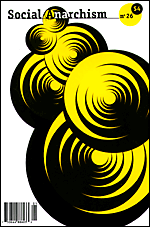The Vanishing Individual
Wayne Burns writes as a man who, because of his personal makeup, and the time and places and circumstances in which he grew up, found himself, some thirty years ago, totally at war with the System and therefore with his culture — over his and others' right, not just to be individuals, but to be able to live and express themselves as individuals necessarily at odds with the System. And since he believes that he has over the years found a viable way to achieve and maintain this individuality, which he defines as parasitic anarchism, he wants others to know about it too — and perhaps, if they choose, share some version of it.
To clarify where he is coming from, and trying to go, Burns in his opening pages provides a summary statement of his intellectual premises:
1) That it is no longer possible (if it ever was) to overthrow or modify or significantly ameliorate the system of corporate capitalism that now controls every aspect of our world; 2) that the American state (along with every other democracy in the Western world) exists only to serve the world-wide capitalist system; 3) that this system, via the media and "manufactured consent," not only controls the minds of good citizens but the choices open to their controlled minds — thereby turning democracy into a farce; 4) that those of us who can, in Kundera's phrase, recognize this "world for the trap it has become" have no choice but to find ways around or through the trap — ways that will, in relation to the system, necessarily result in our being, in some measure, parasites on the body social and the body politic; 5) that those who find these ways and share their findings with others will, in effect, be functioning as parasitic anarchists, however they choose to identify themselves.
My first three points, outlining my understanding of the System, are in no sense new. They are, in capsule form, a restatement of Herbert Marcuse's comprehensive indictment of the System in his One-Dimensional Man. For Marcuse, however, there is still a faint hope, not that the System can be ameliorated, but that it can, through what he calls the Great Refusal, be overthrown — a hope that I can sympathize with but cannot share. The only possibility I see is for the smallest of refusals, by individuals — a refusal which will not seek to alter the System by political or any other means but will instead seek to escape from it while remaining nominally within it. Hence my points 4 and 5, in which I indicate my anarchist alternative.
Working from these premises and drawing upon his own experience as a professor at the University of Washington, Burns proceeds in Part II to show that the campus revolution of the sixties, for all its outward manifestations of dissent, was not a revolution at all. It was but a violent prelude to abject submission. Nor did it matter to the System that the submissive students insisted on bringing their attitudes and causes and movements with them, since everything they believed in and advocated fit neatly into everything the System deemed essential to its hegemony.
Burns also recounts a number of his own personal encounters with the student zealots in his classes, including one in which a feminist student drew a pistol and threatened to shoot him for "the greater good of womankind."
Burns argues further (in Part IV, "The Aftermath of the Sixties," and Part V, "The Philistine Roots of Postmodernism") that Postmodernism is likewise reactionary — a rhetorical denial of reality that serves to rationalize and justify every aspect of the System. Burns' argument, in which he takes on Eagleton and Sa�d and numerous other postmodernists, culminates in his long quote from Jacques Ellul in which Ellul demonstrates how postmodern theory contributes to "the survival of the system and the adaptation of individuals to their disindividualization."
In Part VI, Burns dissects the American Dream, as it is purveyed at the lowest and highest intellectual levels (from TV to the most liberal and radical journals) to show that even "an otherwise great thinker like Noam Chomsky fails to realize that the System, the workings of which he has exposed more effectively than anyone else, cannot be humanized…[or] modified or changed — no matter how much it is exposed."
Confronted with such an impregnable, all powerful, all devouring System, individuals have no choice but to take evasive measures. And if they choose some version of parasitic anarchism they can, Burns maintains, find all kinds of encouragement and help in books — more particularly in the great novels of the past and near past. In Parts III, V, and VII, Burns demonstrates how great or near-great novels have always been anarchistic, in the sense that they have been at pains to show that no society, no morality, has ever been equal to the needs of any individual. Part III, in which Burns presents his own theory of fiction and relates it to the parasitic anarchism, is no doubt the most revolutionary part of the book. But if it proves to be heavy going for readers not that much interested in fictional criticism Burns offers further and more direct clarification of his critical arguments in Part VII, "The Panazaic Parasitic Anarchist Alternative."
This is a highly unusual book, possibly a great book. Burns has put himself as well as his ideas directly on the line, without any attempt at literary camouflage, in a way few writers have been willing to do in recent years. In his closing pages, after recalling Alex Comfort's words concerning the need to "see everyone naked and be as naked ourselves," Burns goes on to say: "I have been trying to write this way from the beginning." And that, I believe, is how he has written.

